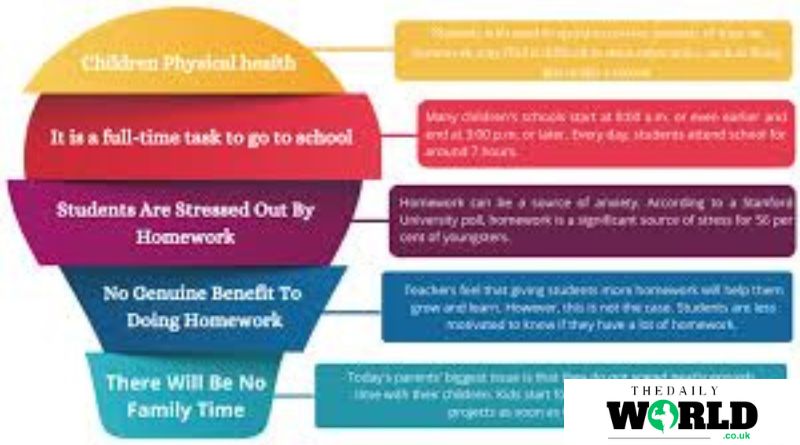Homework has long been a staple of education systems worldwide, with the belief that it fosters discipline, reinforces learning, and promotes academic success. However, increasing research and a shift in educational perspectives have led to a growing movement that questions the traditional reliance on homework. Many educators, psychologists, and parents now argue that homework, especially excessive amounts, may do more harm than good. This article delves into why homework should be banned, exploring its negative impact on students’ mental health, the erosion of family time, and the true benefits of unstructured time.
The Negative Impact of Homework on Mental Health
The first and perhaps most concerning argument for banning homework is its detrimental effect on students’ mental health. In today’s competitive educational environment, students are often overwhelmed by the pressure to excel academically. This pressure is exacerbated by an ever-increasing amount of homework, leading to significant stress. According to studies, stress levels in children have been rising, with homework cited as one of the leading causes of anxiety.
When students are burdened with homework after a full day of school, their ability to relax, unwind, and engage in recreational activities is severely limited. This can lead to feelings of burnout, exhaustion, and depression. Mental health professionals have voiced concerns over the rise in anxiety disorders among young people, some of which are attributed to the academic pressures imposed by homework.
Moreover, homework does not always contribute positively to a student’s cognitive development. When students are forced to complete assignments under duress, the quality of their learning is compromised. Research has shown that stress hinders cognitive function, making it more difficult for students to retain information and engage in productive learning. Instead of fostering creativity and a love for learning, homework creates a cycle of stress and disengagement.
Homework and the Erosion of Family Time
Family time is an essential aspect of a child’s development, providing a space for emotional support, bonding, and shared activities. However, homework often intrudes on this valuable time. When children spend hours completing assignments, they are less able to participate in family dinners, outings, or even simple conversations with parents and siblings.
For working parents, the situation can be even more challenging. Parents may struggle to help their children with homework due to time constraints or lack of knowledge about the subject matter. This can create tension and frustration on both sides. Instead of spending quality time together, families often find themselves in a stressful battle over homework, with little room for relaxation or meaningful interaction.
The importance of family time cannot be overstated. Research suggests that strong family connections lead to better emotional and academic outcomes for children. When homework dominates a child’s schedule, it erodes these opportunities for connection. Banning homework would restore balance to students’ lives, allowing them to spend more time with their families, which has been shown to improve overall well-being.
The Decline of Play and Physical Activity
One of the major drawbacks of the traditional homework model is the reduction in time available for play and physical activity. Unstructured play is crucial for a child’s development, contributing to their social, emotional, and physical growth. When children are constantly busy with homework, they are deprived of the time needed to engage in these essential activities.
Play allows children to develop problem-solving skills, creativity, and resilience. It provides them with a break from the structured environment of school, fostering imagination and self-expression. Physical activity, on the other hand, is vital for maintaining good health, boosting mood, and improving concentration. Both of these activities are often sacrificed in favor of homework, which can lead to a range of issues, from obesity to social isolation.
Banning homework would help students reclaim the time they need to engage in unstructured activities. This would promote physical health, social development, and creativity, all of which are essential components of a well-rounded education.
The Shift Towards Student-Centered Learning
Education should be about fostering a love for learning, not about meeting arbitrary benchmarks. The traditional homework model often stifles creativity and curiosity, as students are focused on completing assignments rather than exploring topics that genuinely interest them. Banning homework would shift the focus of education back to student-centered learning, where the needs and interests of students guide their educational experiences.
In recent years, there has been a growing movement toward project-based and experiential learning, which allows students to explore subjects in a more hands-on and engaging way. These learning methods encourage critical thinking, collaboration, and problem-solving skills—skills that are increasingly important in the modern world. By removing homework, educators can give students more time to engage in these types of learning experiences, which have been shown to produce better long-term academic outcomes.
Furthermore, when students are not burdened by homework, they have more opportunities to pursue their own interests, whether in the arts, sports, or other extracurricular activities. This autonomy fosters a sense of ownership over their learning, which has been linked to greater motivation and academic success.
Research Supporting the Case for Banning Homework
A growing body of research supports the idea that homework, particularly excessive amounts, does not significantly improve academic performance. In fact, studies have shown that the correlation between homework and academic success is minimal, especially for younger children. For example, a study published in the Journal of Educational Psychology found that homework has little to no effect on the academic achievement of elementary school students.
Additionally, the National Education Association (NEA) and the National Parent Teacher Association (PTA) recommend a “10-minute rule” for homework, suggesting that children in kindergarten should have no more than 10 minutes of homework per day, with the amount increasing by 10 minutes each subsequent grade. However, many schools exceed this guideline, assigning excessive amounts of homework that lead to stress and burnout rather than productive learning.
Moreover, countries with less emphasis on homework, such as Finland, consistently outperform those with a heavier homework load, such as the United States, in international educational assessments. This suggests that the quality of education, rather than the quantity of work assigned, is the key to academic success.
The True Benefits of Unstructured Time
Unstructured time is essential for the development of well-rounded individuals. It allows students to relax, recharge, and engage in activities that bring them joy. Whether it’s spending time with friends, participating in hobbies, or simply resting, these moments of unstructured time contribute to a healthier, more balanced life.
When students are given the freedom to choose how to spend their time outside of school, they can explore their passions and interests in ways that homework doesn’t allow. This fosters creativity, independence, and emotional resilience, all of which are crucial for success in both personal and professional life.
Unstructured time also provides the mental space necessary for self-reflection and personal growth. Students who are constantly engaged in homework may struggle to find time for introspection or to develop the emotional intelligence needed to navigate life’s challenges. By removing homework, students can gain the freedom to engage in self-directed learning and personal development, which are invaluable skills in the modern world.
Conclusion: A Future Without Homework
The case for banning homework is clear: it has detrimental effects on students’ mental health, erodes family time, limits opportunities for play and physical activity, and does little to enhance academic success. By embracing a future where homework is eliminated or significantly reduced, students would gain the freedom to explore their interests, develop crucial life skills, and prioritize their well-being.
Unstructured time is not just a luxury; it is a necessity for the growth and development of children. Instead of focusing on hours of homework, we should prioritize education that fosters creativity, emotional resilience, and a lifelong love of learning. Banning homework would allow students to reclaim their time and enjoy a healthier, more balanced life, both in and outside the classroom.
This paradigm shift in education would not only improve academic performance but also ensure that children grow into well-rounded, mentally healthy individuals. The true benefits of unstructured time far outweigh the temporary advantages of completing yet another homework assignment. It is time for education systems around the world to reimagine learning and embrace the power of unstructured time.
Read also: check













